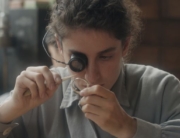Following in the tradition of the Romanian New Wave, Child’s Pose is realistic in tone and minimalist in its approach. Intentionally shot like a documentary, director Calin Peter Netzer wanted to capture a pathological mother-son relationship in this quiet drama about an overprotective parent who goes to all lengths to protect her 30-something-year-old son. Winner of the top prize at last year’s Berlin Film Festival, the film will have its fans in those who appreciate dark, intimate dramas.
Cornelia (Luminita Gheorghiu) is a tough, wealthy, Bucharest-based architect with a meek husband. Her world is turned upside down when she receives a call from the police informing her that her son, Barbu (Bogdan Dumitrache), was in a car accident resulting in the death of a child. In his testimony to the police, Barbu freely admits that he was speeding. However, Cornelia refuses to let her son’s life be ruined by the incident so she doggedly takes steps to clear him.
Child’s Pose is essentially a quiet suspense film, but it’s also a commentary on the Romanian nouveau riche and how they work the system. With money comes power and the ability to protect one’s family. Gheorghiu’s performance is impressive as a mostly unlikable character. She barrels her way through the police station, undeterred by the grieving parents or hard-bitten police officers. She meets with an eyewitness of the accident and is unfazed by it all. Similarly, Dumitrache plays the bratty son convincingly, capturing both a level of entitlement and actual guilt, while caught in his mother’s control. The gritty, handheld cinematography provides the feeling of immediacy, as if we were witnessing the events in real time.
It’s a film that’s successful on a social commentary level, but the characters are hard to feel sympathy for. Similarly, Lee Chang-dong’s Poetry has a maternal figure working to conceal the heinous crime of a child. In that film, the maternal figure was rightly torn, and we sympathized with her struggle to protect her family and do what was right. In Child’s Pose, Cornelia is more like a bull with a mission and we get very little sense of conflicting feelings. In that way, it’s hard to relate to her cause and so we partly want her son to get his comeuppance. Perhaps we’re meant to feel that way, but as an audience member, I wanted more emotional involvement.
















Leave A Comment